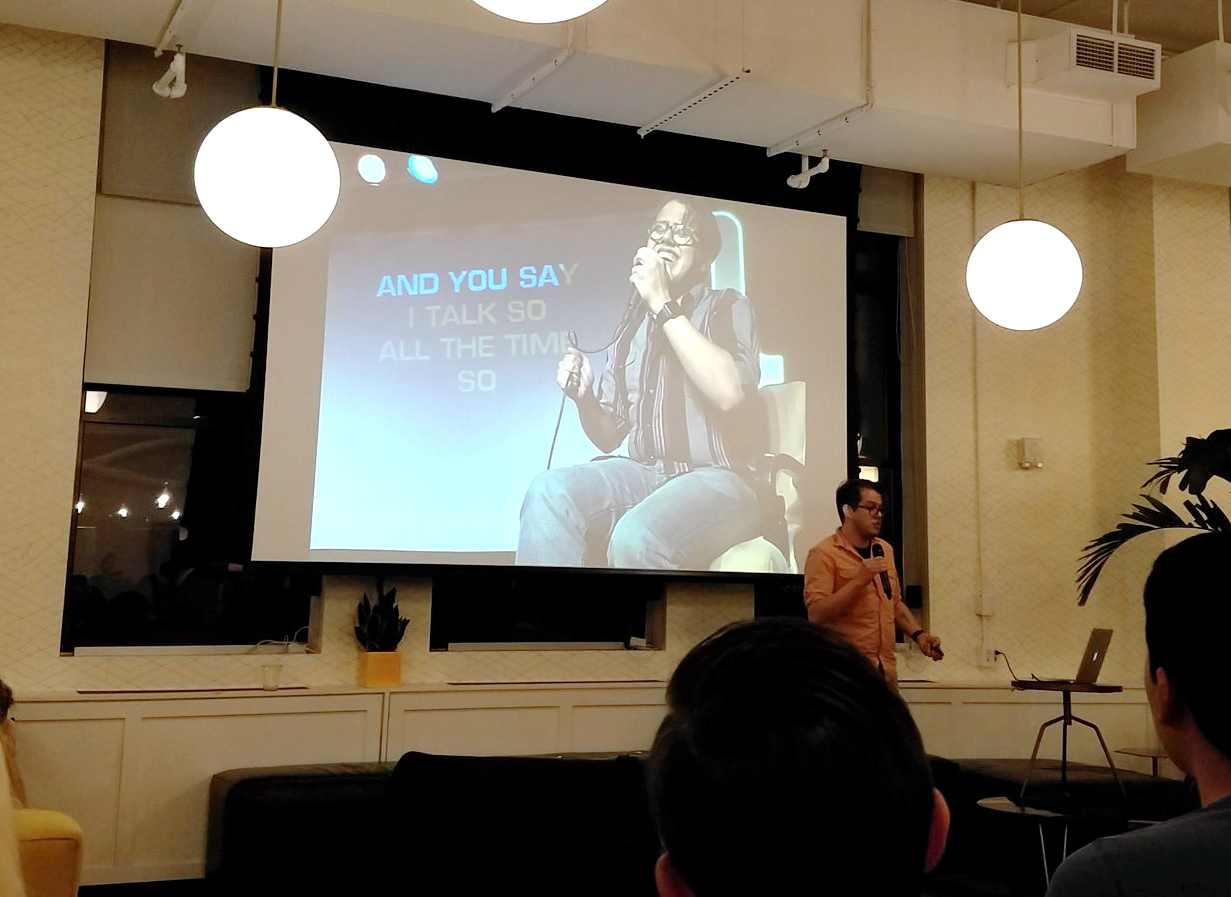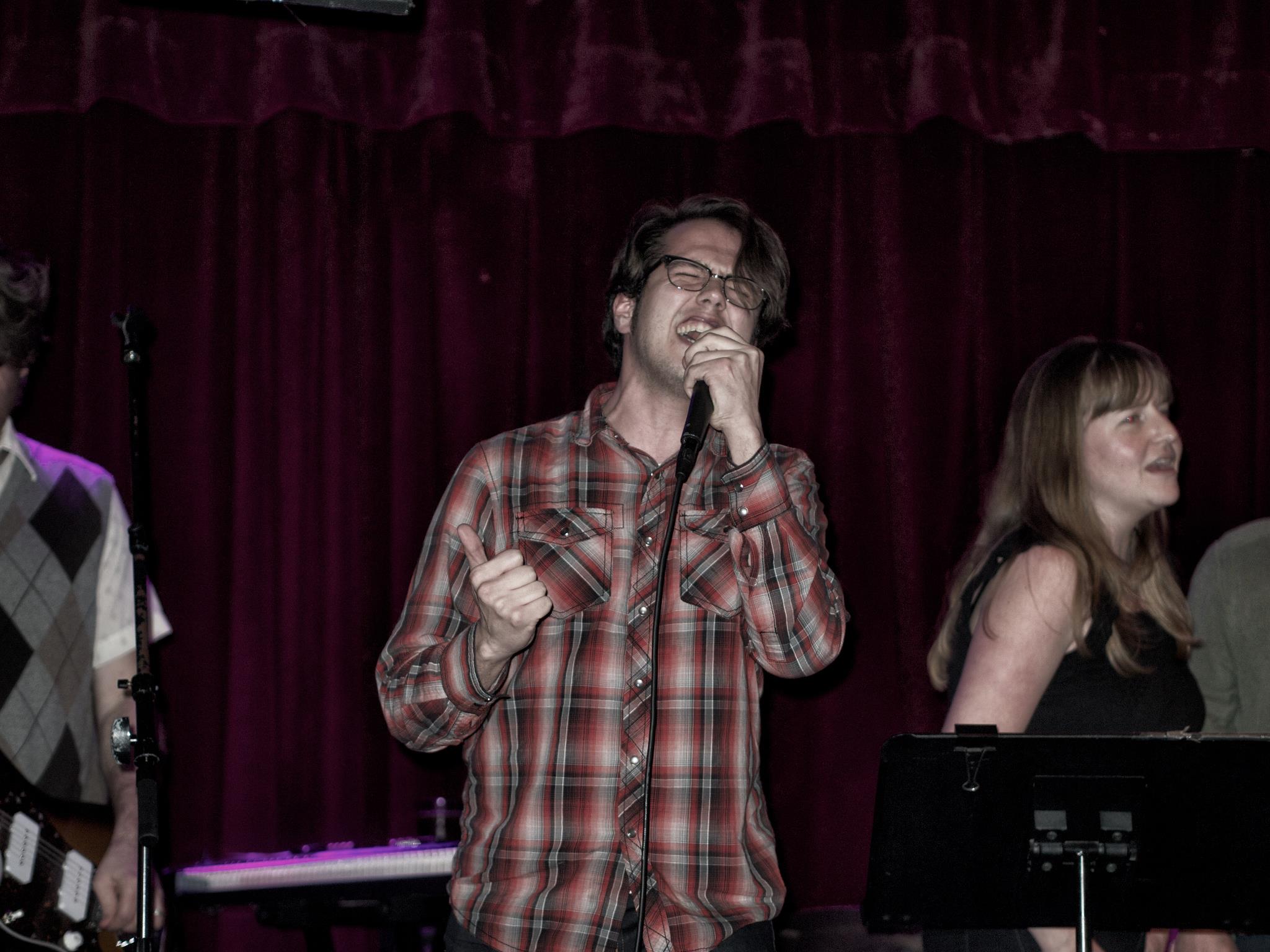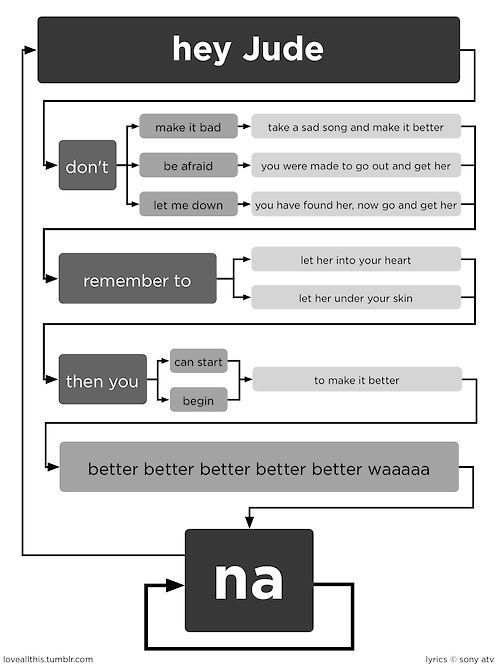Don't Stop Believing
This is a transcript of a talk Justin gave on the Karaoke Theory project.

Don’t Stop Believing: Towards a Collaborative Theory of American Karaoke
For much of my life I’ve been a karaoke lover, but recently I’ve become a karaoke thinker. Ive been working on a podcast on karaoke theory — coming out this July — and I want to share some of my insights with you.
First: a little background. Sing-alongs have existed as long as music itself, but in 1971, the modern karaoke machine was invented by Japanese musician Daisuke Inoue. As the story goes, a band he was managing was doing what we now call live band karaoke, and he wanted to take the act on the road without actually bringing the band. The word “karaoke” itself is a portmanteau of “kara ōkesutora”, meaning “empty orchestra”. But this talk is not an in-depth history; after all, we’ve all got the same wikipedia.
Karaoke became a widespread cultural phenomenon, first in Japan and later throughout the rest of Asia. I don’t have much insight into these cultures. American karaoke, though it’s largely built upon the infrastructure originally provided for Japanese, Filipino and Korean audiences, is still a bit of a novelty and has a different place in society.
I can only speak to my own experiences. So tonight, I’m sharing my personal observations and insights from American karaoke culture. I want to focus on two questions people ask me as a karaoke “expert”: how do you pick the right song, and why do I love karaoke?
Picking a Song: For the Audience
So first question: how to pick a song. A lot of people tell me that they enjoy going to karaoke with friends but they don’t know what to sing. They say they can’t sing or they’ve got such a limited vocal range that they don’t know what they can do.
My core belief is that successful karaoke is entirely a matter of engaging the audience. A good singing voice is far less important than a willingness to work the crowd. And given that most of the audience is there because they want to sing, the best songs are those that the audience can sing along with you.
Digital music has enabled even the sketchiest booth karaoke to have massive selections, and its easy to be overwhelmed with a selection of 80 thousand songs. The purpose of karaoke is not to show off your obscure, cultured tastes; you want to pick a song that everyone can enjoy.
This doesn’t mean you have to stick to pop hits; it all depends on the audience. Some audiences will be really into showtunes, but there’s a lot of people who have an almost visceral repulsion to them. As tempting as it is, you’re not gonna trick people into liking Hamilton.
Different crowds will have different definitions of “classics.” Talking Heads aren’t particularly obscure and Stop Making Sense came out the year I was born, but I’ve seen wildly different reactions to “This Must be the Place” at karaoke. Some — lets just say Bushwick — audiences really dig it, and some others are left totally confused. (You could even say…scratching heads.) It can be tricky to read a room before you’ve heard other people’s selections.
In my experience, the safest bets are songs that were popular when you were a kid — something you and your cohort might have been into before your tastes became more discriminating.
You’ll also want to select songs that are right for the energy level. Karaoke is a party. This doesn’t mean you’ll always want to perform upbeat songs, but you don’t want to suck all the energy out of the room.
When you do sing slower songs, go for melodramatic fist pumpers – familiarize yourself with the oeuvre of Jim Steinman:
- Celine Dion “It’s All Coming Back to Me Now”
- Bonnie Tyler “Total Eclipse of the Heart”
- Air Supply “Making Love Out of Nothing t All”
- Meat Loaf “I’d Do Anything for Love (But I Won’t Do That)”
Picking a Song: For Yourself
But you’re not picking songs solely for other people. You want to make a connection with the audience, but you want to express yourself too. What’s your part of the bargain? How do you go from a metaphorical “song in your heart” to a literal one?

I said earlier that its not that important to be a good singer — I’m speaking from experience here. I can carry a tune, but I don’t have what one would call a “beautiful voice.” But you can tell, whatever this song is, I’m singing the shit out of it. I put a lot of effort into karaoke.
That doesn’t mean that I only do “serious” songs, but it means that if I’m doing a joke I commit to the bit. If i’m gonna sing Freak on a Leash, you better believe I’m gonna put everything I’ve got in the ba-boom-bap-ba-ooh-ah-ma-ee-ma section. Sincerity is way more fun than ironic detachment.
I keep a list of songs I want to try at karaoke, and I practice at home until I can get through the song without looking at the words. I recognize this is probably more homework than you’d expect for something you do drunk with your friends. But whether or not you practice as much as I do, I’d still recommend that you keep a list. This will help you avoid the analysis paralysis you’d get if you were just trying to pick a song out of the big book. Anyways, we were all teenagers once, so a lot of us already have songs that we know inside and out — Lord knows I’ve got huge sections of my brain dedicated to Weezer lyrics.
Cause even if you don’t commit to it at the level that I do, you will need to actually know the songs. The words are gonna fly by faster than you’d expect — you need to go in knowing the verses just as well as the choruses; you should be comfortable singing the song without feeling like you’re struggling to keep up. As a performer, you want to get yourself into a place where you’re not just reciting the song; you want the audience to feel like you’re expressing your innermost feelings spontaneously and it just happens to come out in the form of a 90s pop hit.
This sounds ridiculous on the face of it, but this is exactly how we interact with popular music. I think this is why those melodramatic Jim Steinman power ballads are so effective — they’re songs where you can really find catharsis in their performance. This is what people respond to in karaoke — nobody’s expecting an amazing singer, but we’re hoping for someone who’s emotionally inhabiting the song. I like to think of karaoke is a safe space where you can lay bare your soul – sing words you could never say. You would be sincerely troubled if an ex showed up at your house and said “you told me you’d hold me until you died… but you’re still alive.” And yet: totally normal in a song!
Taking this to its logical conclusion: sometimes when I’m singing I’m speaking directly to someone in the audience.
January 2013: Cheap Trick, “I Want You to Want Me”
A few years ago I caught eyes with a woman at my local karaoke haunt. I sang Cheap Trick, she sang Natalie Imbruglia, but we really connected when we sang — you guessed it — “Total Eclipse of the Heart.”
February 2013: Carly Simon, “(Loving You’s) The Right Thing To Do”
One thing led to another and soon we were inseparable.
April 2013 : Bonnie Raitt, “I Can’t Make You Love Me”
Alas, our love was not meant to be. You may need to know the words in advance because you are blinded by your tears.
Picking a Song: For the Medium
A lot of otherwise great songs are undone by long instrumental sections. Nothing inspires people to get in line for the bathroom quite like seeing “Intro, 1 minute 57 seconds.” Even if they do stick around, what are you supposed to do on stage? And no matter how hilarious it would be to do a song like Santana & Rob Thomas’ “Smooth,” its just got too many wanky guitar solos.

Credit: Sarah Emerson – buy a print!
Long, repetitive outros can be troublesome as well. “Hey Jude” is a song that everybody knows and loves and can sing along, which is great for karaoke. However, the last, like, four minutes of it is na-na-nas. People will na-na-na with you for four minutes, but you have to keep the energy building. This means that if you want to pull it off, you’ve gotta do the four minutes of melisma and ad-libs over the na-na-nas. The simpler the song, the wider you need to open the emotional conduit.
Karaoke and Gender
Karaoke songs don’t have to be solely about our own lived experiences. Something I really appreciate about karaoke is connecting my emotional landscape, my slice of the human experience, with perspectives I haven’t seen and lives I haven’t lived. For this reason, I sing a lot of women’s songs.
I have two guidelines to doing this thoughtfully. First, sing in your own voice. Singing in a jokey falsetto distances yourself from the emotional truth of the song. My singing voice is somewhere along the ted leo-john darnielle axis; this doesn’t prevent me from singing madonna, I just sing an octave lower.
That said, I never swap the pronouns. The short answer is that swapping pronouns reads like gay panic/”no homo” to me. The long answer is that – not to go all tumblr on you – as a queer person, I appreciate opportunities to be out and weird without making an overt political statement by my mere existence.
I particularly appreciate songs like Robyn’s “Call Your Girlfriend” or Taylor Swift’s “You Belong with Me”. They’re wonderful songs to begin with, but they become vastly richer in pathos when contextualized as queer anthems.
Don’t you tell her how I give you something that you never even knew you missed
Don’t you even try and explain how it’s so different when we kiss
Karaoke and Race
Another, more complicated axis in karaoke is race. Now, karaoke allows us to publicly inhabit emotional states that we couldn’t express otherwise; to sing words we could never say.
Well, not quite every word! There’s one that appears in a lot of popular music that people who that word has not historically referred to should avoid, even if its in song lyrics. Here are some words that you can use instead:
- Ninja
- Neighbor
- Nephew
White people should think hard about their motives for performing hip hop in general. There’s a belief that its incongruous and therefore inherently funny for a white person to rap. This might have been true in the 80s but hip hop has been the dominant form of pop music for the last 20-odd years; if you pick a rap song people are expecting you to nail it. Just as you would with any other song, you need to have respect for the material and for the audience. As hard as it is to fake your way through a sung verse, its vastly more difficult to fake through a rapped verse. The words will be going by faster with more complex scansion – you will necessarily have to know most of the words already.
Why Karaoke? Finding the cultural purpose
Now, the other question I raised at the beginning of this talk is why do I love karaoke? Well, the short answer is that I’m a narcissist who loves attention; its the same reason I’m giving this talk. Also, its been a surprisingly effective way to meet women. But theres more to it than that; I think karaoke serves a purpose in our culture.
I’ve been trying to figure out: what kind of art form is karaoke? On one hand, it’s clearly a folk art. Karaoke bears the same relationship to professional music as a community dance does with ballet, or traditional crafts with haute couture. Like all folk art, karaoke thrives in tradition and familiarity, not novelty and surprise.
On the other hand, karaoke is totally artificial. It’s existed for barely more than a generation and its really only possible because of modern recording technology. Karaoke is inseparable from contemporary commerce.
But I believe that karaoke fulfills a role in society, once commonplace, but lost in the modern era. Consider that once, all music was “folk music.” Unless you were an aristocrat, the music you heard was performed by yourself or people you knew. You and your neighbors were the people singing at the village festival and in the church. We were all singing to each other.
In the last century, two major forces disrupted this: First, audio technology completely changed the way we experience music. Recording, amplification and distribution transformed the music industry from publishers of sheet music into what we recognize it as today. This meant that we could hear performances of music we would have never heard before. However it also created a huge asymmetry between music creators and consumers.
The second, more subtle factor was industrialization and the resulting move from towns to cities. Our connection to our communities has become far more abstract – the definition of “our people” has expanded, but our day-to-day lives are far less integrated with them.
Karaoke – the American version of it, at least – is a replacement for this lost communal musical experience. Recording technology and the move to cities were the undoing of the old traditions, but they are exactly what make karaoke possible.
This is the lens I use to make sense of karaoke. You’re not playing the rock star; you’re leading the choir. In my life, karaoke quite literally has taken the place of singing in church.
This doesn’t mean that karaoke is supposed to be a selfless experience; far from it. But karaoke is an empathetic experience: I sing “You Oughtta Know” to get out my feelings; when we sing it together, we create a physical manifestation of empathy: I know you know how I feel, and you know I know, because we’re singing out the same pain. I love karaoke because it is my culture’s emotional circulatory system.